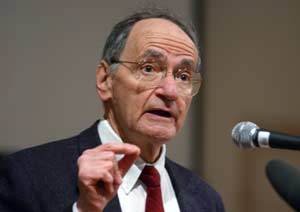Shalom l’kulchem,
In just two weeks we will be lighting our Chanukiyot and celebrating the Festival of Lights, the liberation of Judea by the brave Maccabees in the first heroic war fought for religious freedom. The protection of diversity in the Greek world and the defeat of the cruel Antiochus IV Epiphanes, ruler of the Seleucid Empire, was a major step forward in the development of western history. This war
protected the right of people and peoples to be different, to not be swept along by the desires of oppressive regimes into undermining difference and uniqueness in the human family.
Much of humanity is still struggling for freedom and religious liberty — the Kurds in their battle against ISIS; Israel in its fight to preserve the Jewish state and Jewish religious rights in an environment that demands it disappear and insists it has no historic rights in the land of our ancestors; in Africa with upheavals in Sudan and Nigeria; the Ukrainians in their confrontation with their Russian neighbours; and in Iran, where executions occur daily for defying its monolithic theocratic regime. Indeed, a young woman was imprisoned there, an American-Persian Shiite Muslim in solitary confinement, awaiting sentence of up to six years in prison, and all for watching a men’s volleyball game!
Light those candles and remember how fortunate we are to have our own religious freedom and self-esteem as Jews practising our own religion and faith. May the banner of freedom flourish and grow.
To me, Chanukah, a joyous festival that brightens up the darkest hours of the year, is a time for music, colour, art and learning. On Wednesday 17 December at 7.30 pm, our Synagogue will host a unique concert here in the sanctuary. Alice Burla, an 18-year-old wunderkind at the piano, will perform a programme of Bach, Chopin, Scriabin and Kapustin.
Alice, who hails from Toronto, is already an accomplished player. Her parents are from the former Soviet Union. She began playing the piano at four years old. She won first prize at the Canadian National Music Competition and other major competitions and has participated in major international festivals, including the Verbier Festival, the International Summer Academy Mozarteum at Salzburg, Tel Hai International Piano Master Classes in Israel, the Paderewski Piano Academy in Poland and International Piano Master Classes in Berlin.
In 2007, 2008 and 2011, Alice was featured on Public Broadcast Systems telecasts of Live from Carnegie Hall and appeared as a piano prodigy in the 20th Century Fox major film, Wall Street: Money Never Sleeps. She is currently studying in Madrid with the world’s leading piano instructor, Dmitri Bashkirov, at the Escuela Superior de Musica Reina Sofia.
We have the opportunity to witness a budding star in our own synagogue. Our guest presenter will be my friend, renowned violinist Maxim Vengerov, who played the Tchaikowsky Violin Concerto
at last month’s sell-out concert at the Royal Festival Hall. Maxim and I will start off the evening by interviewing each other about violin, music, being Jewish, and more. Maxim will introduce Alice for 50 minutes of piano, with a special treat at the end.
Please contact the Synagogue for your reservations. Money raised will be used to cover the costs of this special event, to support our Music Committee under chairman Philip Keller and their future endeavours, and leave a little assistance for Alice as she makes her strides in the world of classical music.
Another special guest coming soon is Rabbi William Gershon. We will host him and his wife, Raquel, at Belsize Square Synagogue over Shabbat, 12-13 December. Rabbi Gershon is the President of the Rabbinical Assembly, the umbrella organisation of Conservative-Masorti rabbis worldwide (about 1300 in total). He is coming specifically to give me and us here in London his unqualified support. This is a real honour for the Synagogue and I hope you will come and support his visit.
Rabbi Gershon leads a 2500-member congregation in Dallas, Texas, and was installed as the new rabbinic assembly president in May this year. He will speak at our Friday night and Shabbat morning services, and engage us in learning at our open Lunch and Learn following the morning service. He will also address our Sunday Morning Adult Discussion Group the next day, 14 December, at 10.00am.
FYI: We continue our study of the world’s great thinkers each Sunday morning from 10.00-11.15am. We have already studied Plato and Socrates, moving on to Aristotle, and look forward to further study of Graeco-Roman classical philosophy and Jewish responses from Aristobulus, Philo, the writer of Ecclesiastes and others.
Don’t forget to support our popular annual Bazaar, with the added attraction of a Saturday night Jazz Concert on 6 December, and I look forward to seeing you each Shabbat at Belsize Square Synagogue.
My wishes to each of you and to your loved ones for a joyous, uplifting, candlelit celebration of Chanukah. May freedom endure forever!
Rabbi Stuart Altshuler



